Dawn Read online
Produced by John Bickers and Dagny
DAWN
BY
H. RIDER HAGGARD
1884
"Our natures languish incomplete; Something obtuse in this our star Shackles the spirit's winged feet; But a glory moves us from afar, And we know that we are strong and fleet." Edmund Ollier.
"Once more I behold the face of her Whose actions all had the character Of an inexpressible charm, expressed; Whose movements flowed from a centre of rest, And whose rest was that of a swallow, rife With the instinct of reposing life; Whose mirth had a sadness all the while It sparkled and laughed, and whose sadness lay In the heaven of such a crystal smile That you longed to travel the self-same way To the brightness of sorrow. For round her breathed A grace like that of the general air, Which softens the sharp extremes of things, And connects by its subtle, invisible stair The lowest and the highest. She interwreathed Her mortal obscureness with so much light Of the world unrisen, that angel's wings Could hardly have given her greater right To float in the winds of the Infinity." Edmund Ollier.
DAWN
CHAPTER I
"You lie; you always were a liar, and you always will be a liar. Youtold my father how I spent the money."
"Well, and what if I did? I had to look after myself, I suppose. Youforget that I am only here on sufferance, whilst you are the son ofthe house. It does not matter to you, but he would have turned me outof doors," whined George.
"Oh! curse your fine words; it's you who forget, you swab. Ay, it'syou who forget that you asked me to take the money to the gambling-tent, and made me promise that you should have half of what we won,but that I should play for both. What, are you beginning to remembernow--is it coming back to you after a whole month? I am going toquicken your memory up presently, I can tell you; I have got a gooddeal to pay off, I'm thinking. I know what you are at; you want toplay cuckoo, to turn 'Cousin Philip' out that 'Cousin George' may fillthe nest. You know the old man's soft points, and you keep working himup against me. You think that you would like the old place when he'sgone--ay, and I daresay that you will get it before you have done, butI mean to have my penn'orth out of you now, at any rate," and,brushing the tears of anger that stood in his brown eyes away with theback of his hand, the speaker proceeded to square up to George in amost determined way.
Now Philip, with his broad shoulders and his firm-knit frame, would,even at eighteen, have been no mean antagonist for a full-grown man;much more then did he look formidable to the lankly, overgrownstripling crouching against the corner of the wall that prevented hisfurther retreat.
"Philip, you're not going to strike me, are you, when you know you areso much stronger?"
"Yes, I am, though; if I can't match you with my tongue, at any rate Iwill use my fists. Look out."
"Oh, Philip, don't! I'll tell your father."
"Tell him! why, of course you will, I know that; but you shall havesomething to lie about this time," and he advanced to the attack witha grim determination not pleasant for his cousin to behold.
Finding that there was no escape, George turned upon him with soshrill a curse that it even frightened from his leafy perch in the oakabove the tame turtle-dove, intensely preoccupied as he was in cooingto a new-found mate. He did more than curse; he fought like a corneredrat, and with as much chance as the rat with a trained fox-terrier. Ina few seconds his head was as snugly tucked away in the chancery ofhis cousin's arm as ever any property was in the court of that name,and, to speak truth, it seemed quite possible that, when it emergedfrom its retreat, it would, like the property, be much dilapidated andextensively bled.
Let us not dwell upon the scene; for George it was a very painful one,so painful that he never quite forgot it. His nose, too, was never sostraight again. It was soon over, though to one of the parties timewent with unnatural slowness.
"Well, I think you've had about enough for once," soliloquized Philip,as he critically surveyed the writhing mass on the ground before him;and he looked a very handsome lad as he said it.
His curly black hair hung in waving confusion over his forehead, andflung changing lights and shadows into the depths of his brown eyes,whilst his massive and somewhat heavy features were touched into amore active life by the light of that pleasing excitement whichanimates nine men out of every ten of the Anglo-Saxon race when theyare engaged on killing or hurting some other living creature. Theface, too, had a certain dignity about it, a little of the dignity ofjustice; it was the face of one who feels that if his action has beenprecipitate and severe, it has at any rate been virtuous. The full butclear-cut lips also had their own expression on them, half serious,half comical; humour, contempt, and even pity were blended in it.Altogether Philip Caresfoot's appearance in the moment of boyishvengeance was pleasing and not uninteresting.
Presently, however, something of the same change passed over his facethat we see in the sky when a cloud passes over the sun; the lightfaded out of it. It was astonishing to note how dull and heavy--ay,more, how bad it made him look all in a breath.
"There will be a pretty business about this," he murmured, and then,administering a sharp kick to the prostrate and groaning form on theground before him, he said, "Now, then, get up; I'm not going to touchyou again. Perhaps, though, you won't be in quite such a hurry to telllies about me another time, though I suppose that one must alwaysexpect a certain amount of lying from a half-bred beggar like you.Like mother, like son, you know."
This last sentence was accompanied by a bitter laugh, and produced adecided effect on the grovelling George, who slowly raised himselfupon his hands, and, lifting his head, looked his cousin full in theface.
It was not the ghastly appearance of his mangled and blood-soakedcountenance that made Philip recoil so sharply from the sight of hisown handiwork--he had fought too often at school to be chicken-heartedabout a little bloodshed; and, besides, he knew that his cousin wasonly knocked about, not really injured--but rather the intense andalmost devilish malignity of the expression that hovered on theblurred features and in the half-closed eyes. But no attempt was madeby George to translate the look into words, and indeed Philip feltthat it was untranslatable. He also felt dimly that the hate andmalice with which he was regarded by the individual at his feet was ofa more concentrated and enduring character than most men have thepower to originate. In the lurid light of that one glance he was able,though he was not very clever, to pierce the darkest recesses of hiscousin's heart, and to see his inmost thought, no longer through aveil, but face to face. And what he saw was sufficient to make theblood leave his ruddy cheek, and to fix his eyes into an expression offear.
Next second George dropped his head on to the ground again, and beganto moan in an ostentatious manner, possibly in order to attract someone whose footsteps could be plainly heard proceeding slowly down ashrubbery-path on the other side of the yard wall. At any rate, thatwas the effect produced; for next moment, before Philip could think ofescape, had he wished to escape, a door in the wall was opened, and agentleman, pausing on the threshold, surveyed the whole scene, withthe assistance of a gold-mounted eye-glass, with some evident surpriseand little apparent satisfaction.
The old gentleman, for he was old, made so pretty a picture, framed ashe was in the arched doorway, and set off by a natural background ofvarying shades of green, that his general appearance is worthsketching as he stood.
To begin with, he was dressed in the fashion ofthe commencement of this century, and, as has been said, old, thoughit was difficult to say how old. Indeed, so vigorous and comparativelyyouthful was his bearing that he was generally taken to beconsiderably under seventy, but, as a matter of fact, he was but a fewyears short of eighty. He was extremely tall, over six feet, and stoodupright as a lifeguardsman; indeed, his height and stately carriagewould alone have made him a remarkable-looking man, had there beennothing else unusual about him; but, as it happened, his features wereas uncommon as his person. They were clear-cut and cast in a noblemould. The nose was large and aquiline, the chin, like his sonPhilip's, square and determined; but it was his eyes that gave apainful fascination to his countenance. They were steely blue, andglittered under the pent-house of his thick eyebrows, that, instriking contrast to the snow-white of his hair, were black in hue, astempered steel glitters in a curtained room. It was those eyes, inconjunction with sundry little peculiarities of temper, that hadearned for the old man the title of "Devil Caresfoot," a sobriquet inwhich he took peculiar pride. So pleased was he with it, indeed, thathe caused it to be engraved in solid oak letters an inch long upon theform of a life-sized and life-like portrait of himself that hung overthe staircase in the house.
"I am determined," he would say to his son, "to be known to myposterity as I was known to my contemporaries. The picture representsmy person not inaccurately; from the nickname my descendants will beable to gather what the knaves and fools with whom I lived thought ofmy character. Ah! boy, I am wearing out; people will soon be staringat that portrait and wondering if it was like me. In a very few yearsI shall no longer be 'devil,' but 'devilled,'" and he would chuckle athis grim and ill-omened joke.
Philip felt his father's eyes playing upon him, and shrunk from them.His face had, at the mere thought of the consequences of hischastisement of his cousin, lost the beauty and animation that hadclothed it a minute before; now it grew leaden and hard, the good diedaway from it altogether, and, instead of a young god bright withvengeance, there was nothing but a sullen youth with dull andfrightened eyes. To his son, as to most people who came under hisinfluence, "Devil" Caresfoot was a grave reality.
Presently the picture in the doorway opened its mouth and spoke in asingularly measured, gentle voice.
"You will forgive me, Philip, for interrupting your _tete-a-tete_, butmay I ask what is the meaning of this?"
Philip returned no answer.
"Since your cousin is not in a communicative mood, George, perhaps youwill inform me why you are lying on your face and groaning in thatunpleasant and aggressive manner?"
George lifted his blood-stained face from the stones, and, looking athis uncle, groaned louder than ever.
"May I ask you, Philip, if George has fallen down and hurt himself, orif there has been an--an--altercation between you?"
Here George himself got up and, before Philip could make any reply,addressed himself to his uncle.
"Sir," he said, "I will answer for Philip; there _has_ been analtercation, and he in the scuffle knocked me down, and I confess,"here he put his hand up to his battered face, "that I am suffering agood deal, but what I want to say is, that I beg you will not blamePhilip. He thought that I had wronged him, and, though I am quiteinnocent, and could easily have cleared myself had he given me achance, I must admit that appearances are to a certain extent againstme----"
"He lies!" broke in Philip, sullenly.
"You will wonder, sir," went on the blood-stained George, "how Iallowed myself to be drawn into such a brutal affair, and one sodiscreditable to your house. I can only say that I am very sorry,"--which indeed he was--"and that I should never have taken any notice ofhis words--knowing that he would regret them on reflection--had he notin an unguarded moment allowed himself to taunt me with my birth.Uncle, you know the misfortune of my father's marriage, and that shewas not his equal in birth, but you know too that she was my motherand I love her memory though I never saw her, and I could not bear tohear her spoken of like that, and I struck him. I hope that both youand he will forgive me; I cannot say any more."
"He lies again, he cannot speak the truth."
"Philip, will you allow me to point out," remarked his father in hisblandest voice, "that the continued repetition of the very ugly word'lie' is neither narrative nor argument. Perhaps you will be so kindas to tell me your side of the story; you know I always wish to beperfectly impartial."
"He lied to you this morning about the money. It's true enough that Igambled away the ten pounds at Roxham fair, instead of paying it intothe bank as you told me, but he persuaded me to it, and he was to haveshared the profits if we won. I was a blackguard, but he was a biggerblackguard; why should I have all the blame and have that fellowcontinually shoved down my throat as a saint? And so I thrashed him,and that is all about it."
"Sir, I am sorry to contradict Philip, but indeed he is in error; therecollection of what took place has escaped him. I could, ifnecessary, bring forward evidence--Mr. Bellamy----"
"There is no need, George, for you to continue," and then, fixing hisglittering eye on Philip: "it is very melancholy for me, having onlyone son, to know him to be such a brute, such a bearer of falsewitness, such an impostor as you are. Do you know that I have justseen Mr. Bellamy, the head clerk at the bank, and inquired if he knewanything of what happened about that ten pounds, and do you know whathe told me?"
"No, I don't, and I don't want to."
"But I really must beg your attention: he told me that the dayfollowing the fair your cousin George came to the bank with tenpounds, and told him how you had spent the ten pounds I gave you topay in, and that he brought the money, his own savings, to replacewhat you had gambled away; and Bellamy added that, under all thecircumstances, he did not feel justified in placing it to my credit.What have you to say to that?"
"What have I to say? I have to say that I don't believe a word of it.If George had meant to do me a good turn he would have paid the moneyin and said nothing to Bellamy about it. Why won't you trust me alittle more, father? I tell you that you are turning me into ascoundrel. I am being twisted up into a net of lies till I am obligedto lie myself to keep clear of ruin. I know what this sneak is at; hewants to work you into cutting me out of the property which should bemine by right. He knows your weaknesses----"
"My weaknesses, sir--my weaknesses!" thundered his father, strikinghis gold-headed cane on to the stones; "what do you mean by that?"
"Hush, uncle, he meant nothing," broke in George.
"Meant nothing! Then for an idle speech it is one that may cost himdear. Look you here, Philip Caresfoot, I know very well that ourfamily has been quite as remarkable for its vices as its virtues, butfor the last two hundred and fifty years we have been gentlemen, andyou are not a gentleman; we have not been thieves, and you have provedyourself a thief; we have spoken the truth, and you are, what you areso fond of calling your cousin, who is worth two of you, a liar. Nowlisten. However imperious I may have grown in my old age, I can stillrespect the man who thwarts me even though I hate him; but I despisethe man who deceives me, as I despise you, my dear son Philip--and Itell you this, and I beg you to lay it to heart, that if ever again Ifind that you have deceived me, by Heaven I will disinherit you infavour of--_oh, oh!_" and the old man fell back against the grey wall,pressing his hands to his breast and with the cold perspirationstarting on to his pallid countenance.
Both the lads sprang forward, but before they reached him he hadrecovered himself.
"It is nothing," he said, in his ordinary gentle voice, "a triflingindisposition. I wish you both good morning, and beg you to bear mywords in mind."
When he was fairly gone, George came up to his cousin and laid hishand upon his arm.
"Why do you insist upon quarrelling with me, Philip? it always endslike this, you always get the worst of it."
But Philip's only reply was to shake him roughly off, and to vanishthrough the door towards the lake. George regarded his departing for
mwith a peculiar smile, which was rendered even more peculiar by thedistortion of his swollen features.

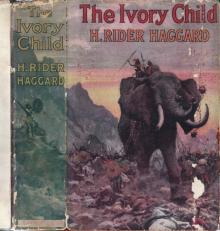 The Ivory Child
The Ivory Child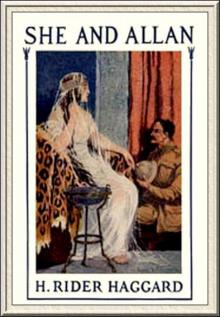 She and Allan
She and Allan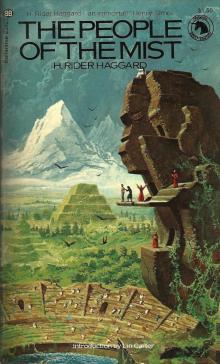 The People of the Mist
The People of the Mist She
She Morning Star
Morning Star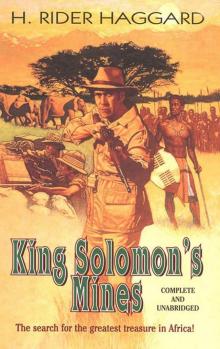 King Solomon's Mines
King Solomon's Mines She: A History of Adventure
She: A History of Adventure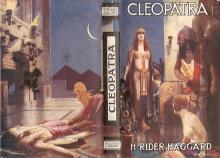 Cleopatra
Cleopatra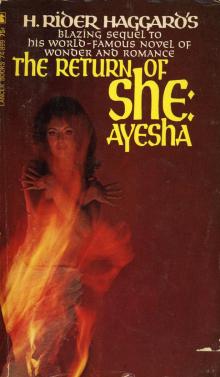 Ayesha, the Return of She
Ayesha, the Return of She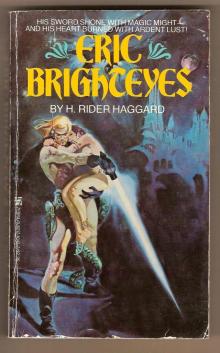 Eric Brighteyes
Eric Brighteyes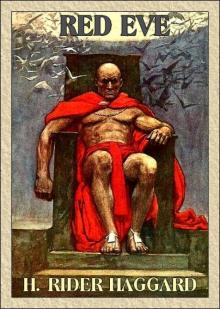 Red Eve
Red Eve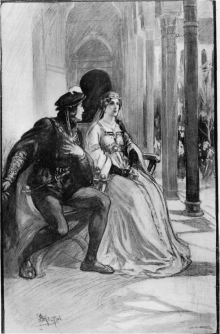 Fair Margaret
Fair Margaret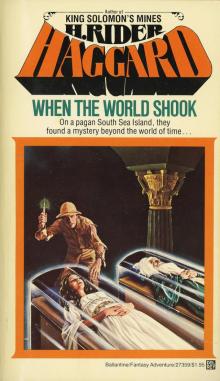 When the World Shook
When the World Shook Lysbeth, a Tale of the Dutch
Lysbeth, a Tale of the Dutch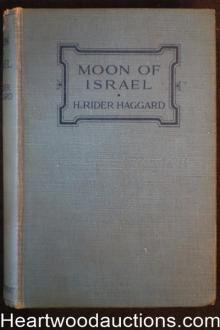 Moon of Israel: A Tale of the Exodus
Moon of Israel: A Tale of the Exodus Long Odds
Long Odds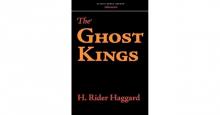 The Ghost Kings
The Ghost Kings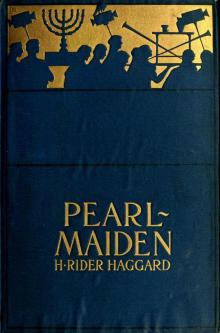 Pearl-Maiden: A Tale of the Fall of Jerusalem
Pearl-Maiden: A Tale of the Fall of Jerusalem Allan and the Holy Flower
Allan and the Holy Flower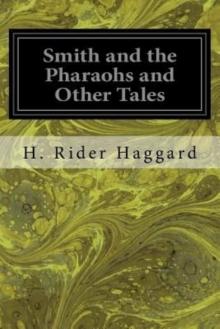 Smith and the Pharaohs, and other Tales
Smith and the Pharaohs, and other Tales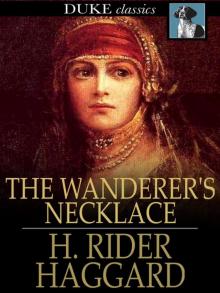 The Wanderer's Necklace
The Wanderer's Necklace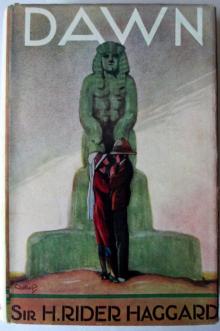 Dawn
Dawn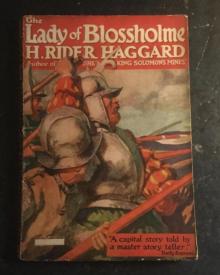 The Lady of Blossholme
The Lady of Blossholme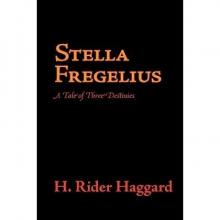 Stella Fregelius: A Tale of Three Destinies
Stella Fregelius: A Tale of Three Destinies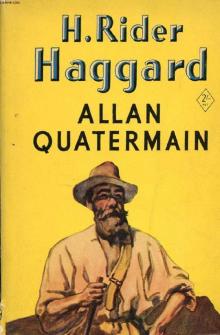 Allan Quatermain
Allan Quatermain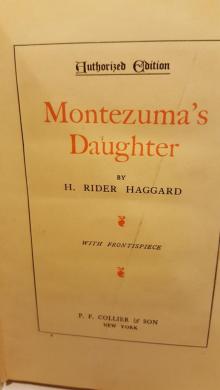 Montezuma's Daughter
Montezuma's Daughter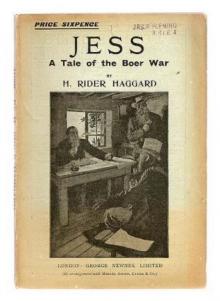 Jess
Jess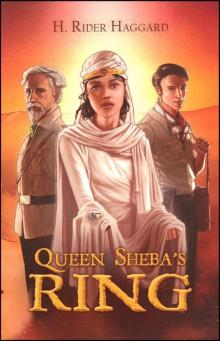 The Brethren
The Brethren Allan's Wife
Allan's Wife Child of Storm
Child of Storm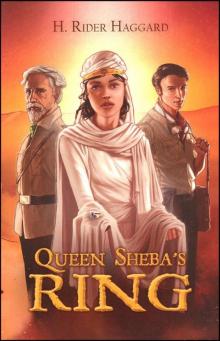 Queen Sheba's Ring
Queen Sheba's Ring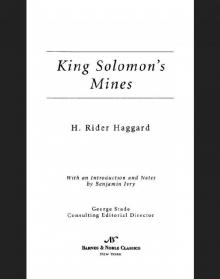 King Solomon's Mines (Barnes & Noble Classics Series)
King Solomon's Mines (Barnes & Noble Classics Series)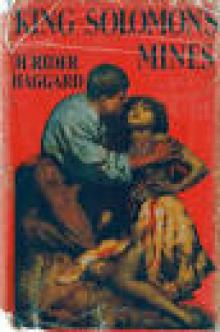 Complete Allan Quatermain Omnibus - Volumes 1 - 10
Complete Allan Quatermain Omnibus - Volumes 1 - 10